BMP4002 Business Law: Understanding the Legal System & its Impact
VerifiedAdded on 2023/06/17
|8
|2588
|138
Report
AI Summary
This report provides a comprehensive analysis of the UK legal system as it relates to business law. It begins by defining laws and identifying the UK's legal systems, then explains classifications of law, including civil and criminal law, and the roles of the High Court and Supreme Court. The report also explores sources of law, such as case law and legislation, including delegated legislation. Finally, it examines UK employment law, focusing on statutory duties of employers, wrongful dismissal, and unfair dismissal actions. This document offers insights into the legal framework governing business operations in the UK.
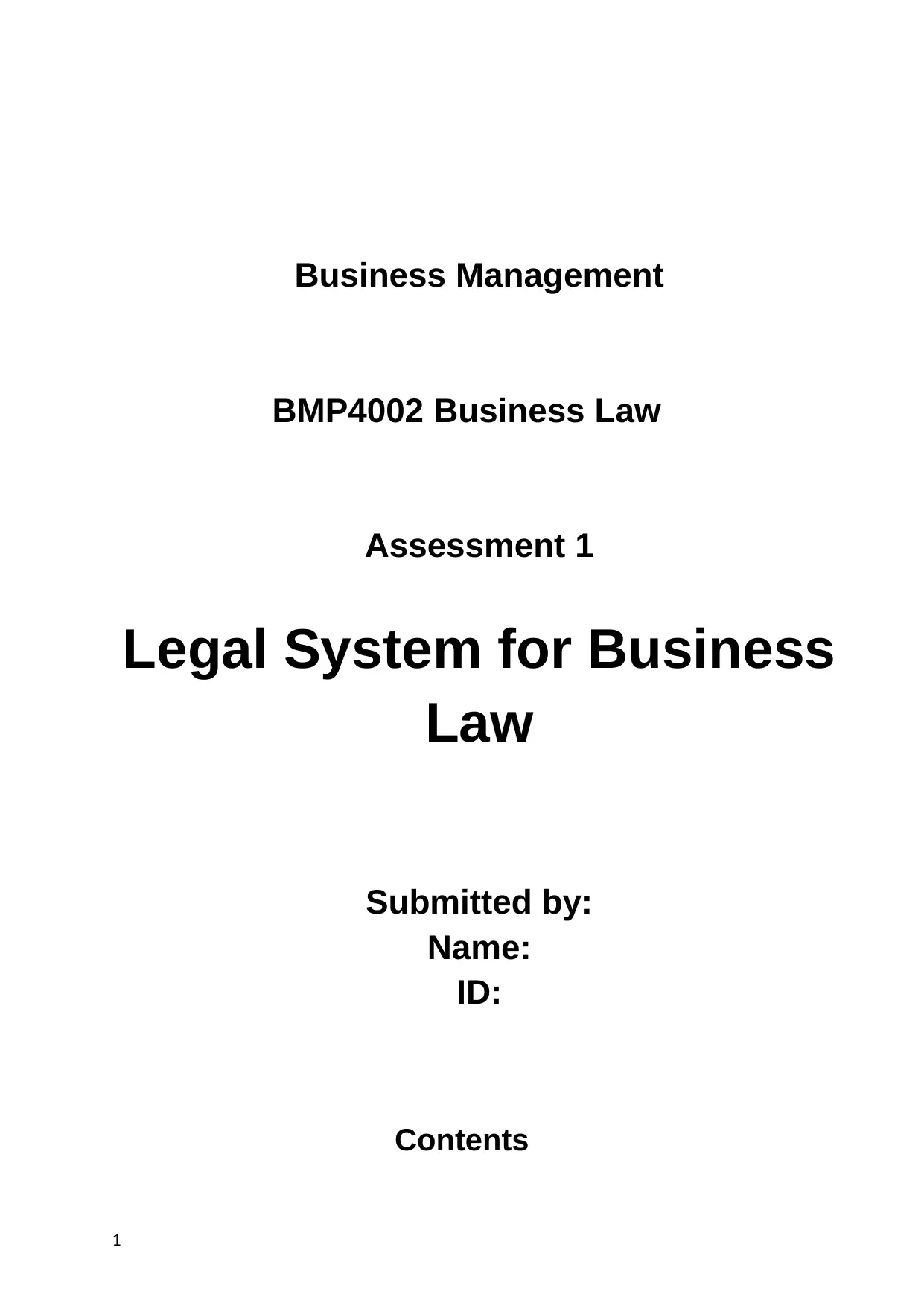
Business Management
BMP4002 Business Law
Assessment 1
Legal System for Business
Law
Submitted by:
Name:
ID:
Contents
1
BMP4002 Business Law
Assessment 1
Legal System for Business
Law
Submitted by:
Name:
ID:
Contents
1
Paraphrase This Document
Need a fresh take? Get an instant paraphrase of this document with our AI Paraphraser
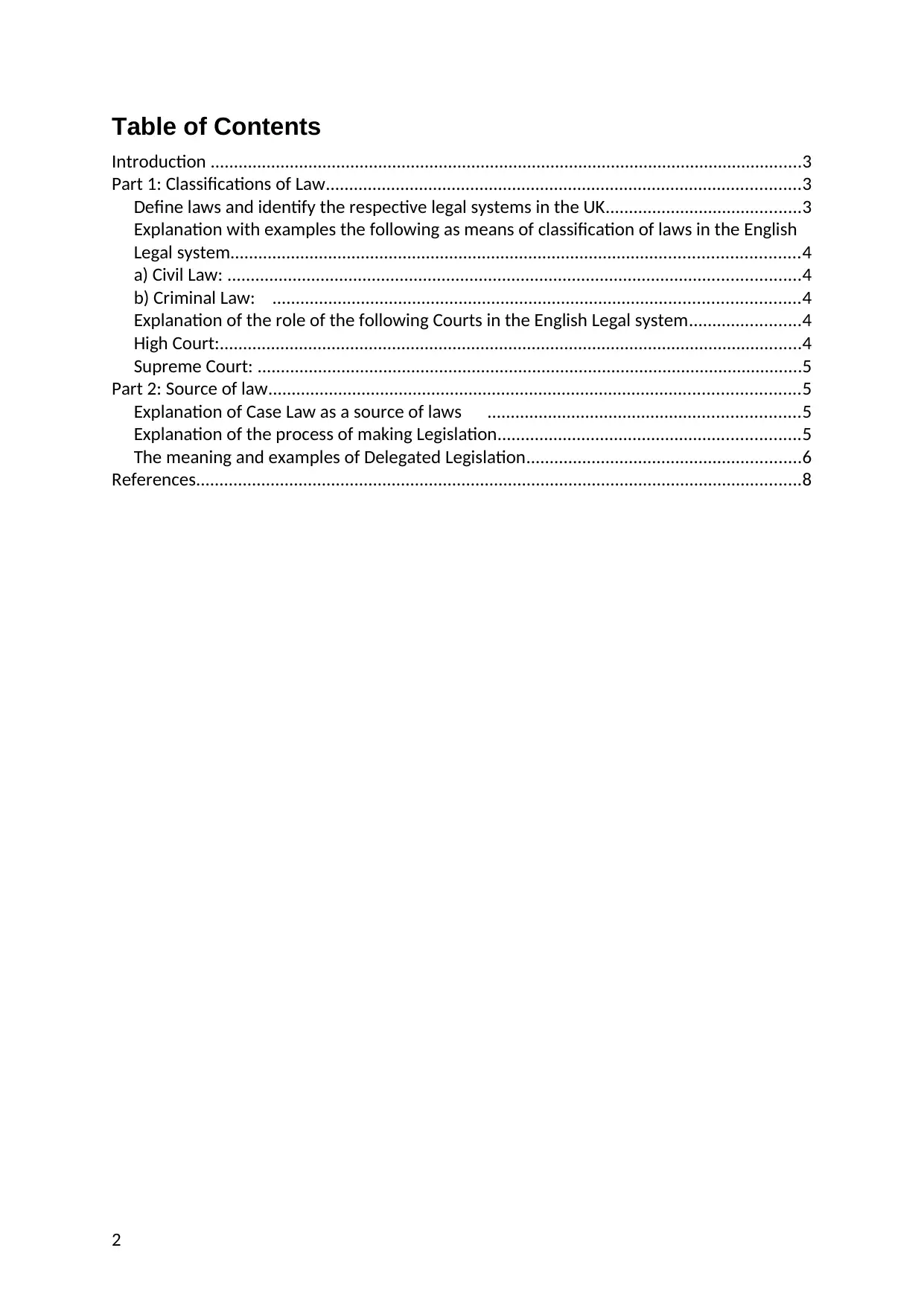
Table of Contents
Introduction ...............................................................................................................................3
Part 1: Classifications of Law......................................................................................................3
Define laws and identify the respective legal systems in the UK..........................................3
Explanation with examples the following as means of classification of laws in the English
Legal system..........................................................................................................................4
a) Civil Law: ...........................................................................................................................4
b) Criminal Law: .................................................................................................................4
Explanation of the role of the following Courts in the English Legal system........................4
High Court:.............................................................................................................................4
Supreme Court: .....................................................................................................................5
Part 2: Source of law..................................................................................................................5
Explanation of Case Law as a source of laws ...................................................................5
Explanation of the process of making Legislation.................................................................5
The meaning and examples of Delegated Legislation...........................................................6
References..................................................................................................................................8
2
Introduction ...............................................................................................................................3
Part 1: Classifications of Law......................................................................................................3
Define laws and identify the respective legal systems in the UK..........................................3
Explanation with examples the following as means of classification of laws in the English
Legal system..........................................................................................................................4
a) Civil Law: ...........................................................................................................................4
b) Criminal Law: .................................................................................................................4
Explanation of the role of the following Courts in the English Legal system........................4
High Court:.............................................................................................................................4
Supreme Court: .....................................................................................................................5
Part 2: Source of law..................................................................................................................5
Explanation of Case Law as a source of laws ...................................................................5
Explanation of the process of making Legislation.................................................................5
The meaning and examples of Delegated Legislation...........................................................6
References..................................................................................................................................8
2
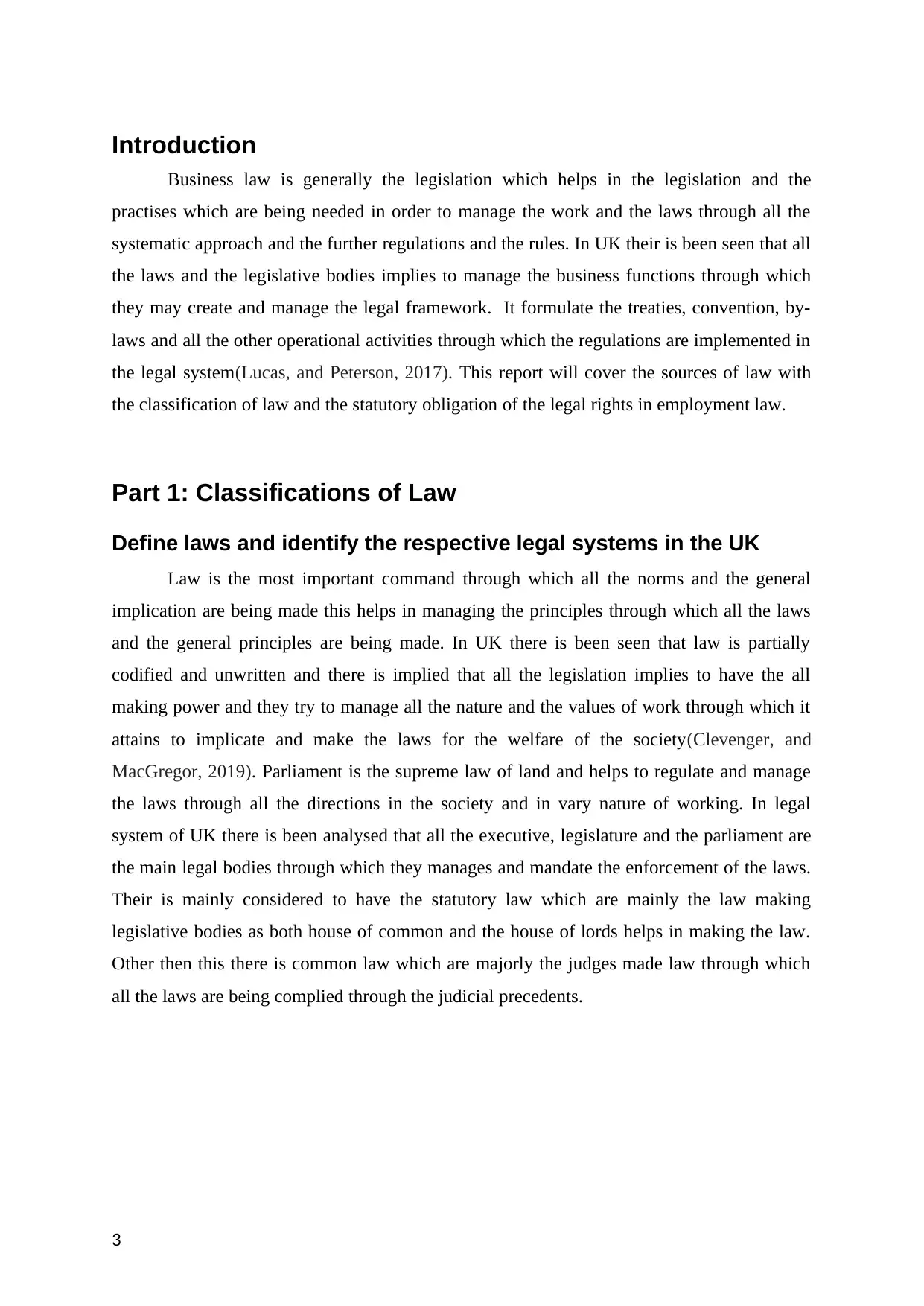
Introduction
Business law is generally the legislation which helps in the legislation and the
practises which are being needed in order to manage the work and the laws through all the
systematic approach and the further regulations and the rules. In UK their is been seen that all
the laws and the legislative bodies implies to manage the business functions through which
they may create and manage the legal framework. It formulate the treaties, convention, by-
laws and all the other operational activities through which the regulations are implemented in
the legal system(Lucas, and Peterson, 2017). This report will cover the sources of law with
the classification of law and the statutory obligation of the legal rights in employment law.
Part 1: Classifications of Law
Define laws and identify the respective legal systems in the UK
Law is the most important command through which all the norms and the general
implication are being made this helps in managing the principles through which all the laws
and the general principles are being made. In UK there is been seen that law is partially
codified and unwritten and there is implied that all the legislation implies to have the all
making power and they try to manage all the nature and the values of work through which it
attains to implicate and make the laws for the welfare of the society(Clevenger, and
MacGregor, 2019). Parliament is the supreme law of land and helps to regulate and manage
the laws through all the directions in the society and in vary nature of working. In legal
system of UK there is been analysed that all the executive, legislature and the parliament are
the main legal bodies through which they manages and mandate the enforcement of the laws.
Their is mainly considered to have the statutory law which are mainly the law making
legislative bodies as both house of common and the house of lords helps in making the law.
Other then this there is common law which are majorly the judges made law through which
all the laws are being complied through the judicial precedents.
3
Business law is generally the legislation which helps in the legislation and the
practises which are being needed in order to manage the work and the laws through all the
systematic approach and the further regulations and the rules. In UK their is been seen that all
the laws and the legislative bodies implies to manage the business functions through which
they may create and manage the legal framework. It formulate the treaties, convention, by-
laws and all the other operational activities through which the regulations are implemented in
the legal system(Lucas, and Peterson, 2017). This report will cover the sources of law with
the classification of law and the statutory obligation of the legal rights in employment law.
Part 1: Classifications of Law
Define laws and identify the respective legal systems in the UK
Law is the most important command through which all the norms and the general
implication are being made this helps in managing the principles through which all the laws
and the general principles are being made. In UK there is been seen that law is partially
codified and unwritten and there is implied that all the legislation implies to have the all
making power and they try to manage all the nature and the values of work through which it
attains to implicate and make the laws for the welfare of the society(Clevenger, and
MacGregor, 2019). Parliament is the supreme law of land and helps to regulate and manage
the laws through all the directions in the society and in vary nature of working. In legal
system of UK there is been analysed that all the executive, legislature and the parliament are
the main legal bodies through which they manages and mandate the enforcement of the laws.
Their is mainly considered to have the statutory law which are mainly the law making
legislative bodies as both house of common and the house of lords helps in making the law.
Other then this there is common law which are majorly the judges made law through which
all the laws are being complied through the judicial precedents.
3
⊘ This is a preview!⊘
Do you want full access?
Subscribe today to unlock all pages.

Trusted by 1+ million students worldwide
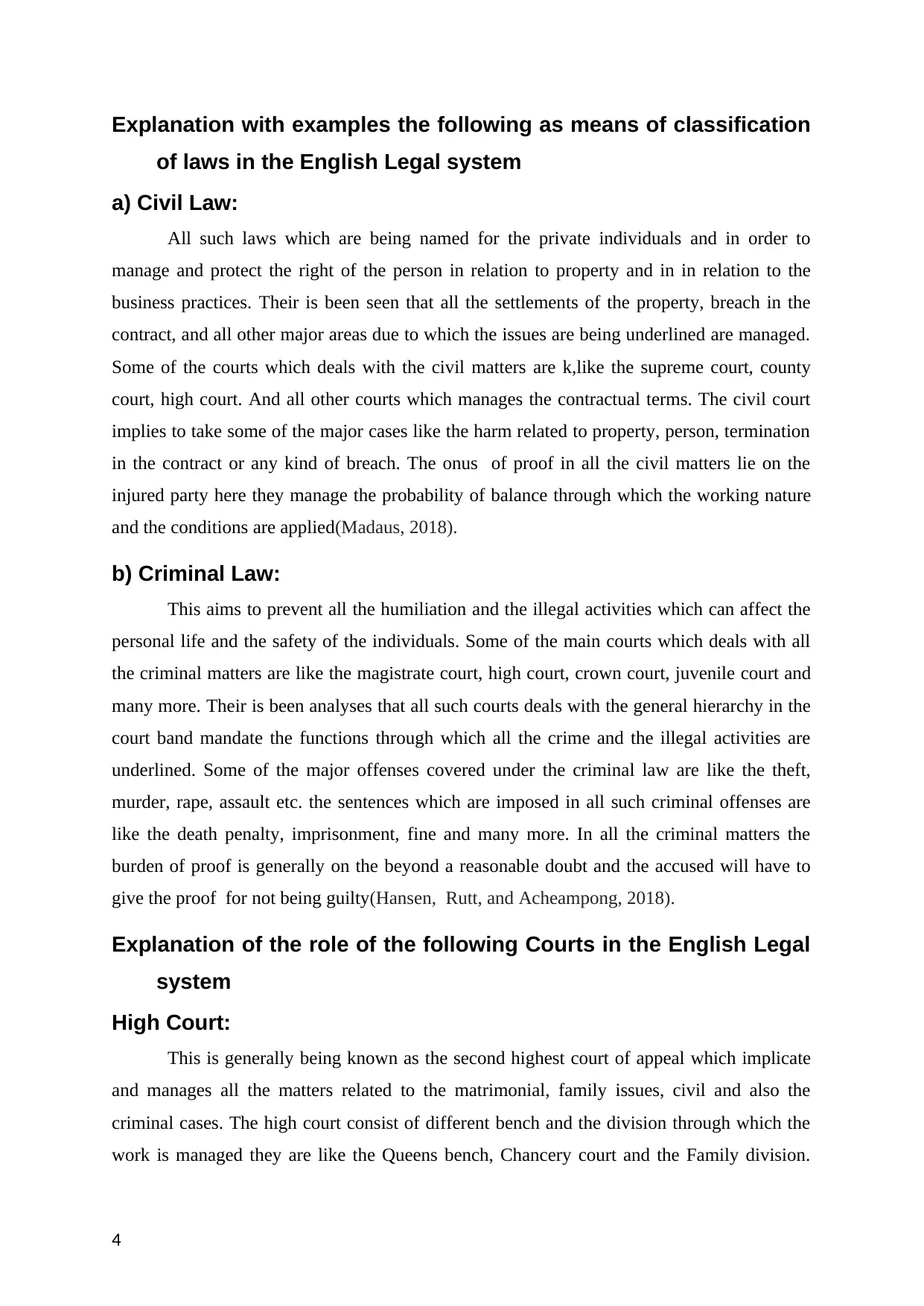
Explanation with examples the following as means of classification
of laws in the English Legal system
a) Civil Law:
All such laws which are being named for the private individuals and in order to
manage and protect the right of the person in relation to property and in in relation to the
business practices. Their is been seen that all the settlements of the property, breach in the
contract, and all other major areas due to which the issues are being underlined are managed.
Some of the courts which deals with the civil matters are k,like the supreme court, county
court, high court. And all other courts which manages the contractual terms. The civil court
implies to take some of the major cases like the harm related to property, person, termination
in the contract or any kind of breach. The onus of proof in all the civil matters lie on the
injured party here they manage the probability of balance through which the working nature
and the conditions are applied(Madaus, 2018).
b) Criminal Law:
This aims to prevent all the humiliation and the illegal activities which can affect the
personal life and the safety of the individuals. Some of the main courts which deals with all
the criminal matters are like the magistrate court, high court, crown court, juvenile court and
many more. Their is been analyses that all such courts deals with the general hierarchy in the
court band mandate the functions through which all the crime and the illegal activities are
underlined. Some of the major offenses covered under the criminal law are like the theft,
murder, rape, assault etc. the sentences which are imposed in all such criminal offenses are
like the death penalty, imprisonment, fine and many more. In all the criminal matters the
burden of proof is generally on the beyond a reasonable doubt and the accused will have to
give the proof for not being guilty(Hansen, Rutt, and Acheampong, 2018).
Explanation of the role of the following Courts in the English Legal
system
High Court:
This is generally being known as the second highest court of appeal which implicate
and manages all the matters related to the matrimonial, family issues, civil and also the
criminal cases. The high court consist of different bench and the division through which the
work is managed they are like the Queens bench, Chancery court and the Family division.
4
of laws in the English Legal system
a) Civil Law:
All such laws which are being named for the private individuals and in order to
manage and protect the right of the person in relation to property and in in relation to the
business practices. Their is been seen that all the settlements of the property, breach in the
contract, and all other major areas due to which the issues are being underlined are managed.
Some of the courts which deals with the civil matters are k,like the supreme court, county
court, high court. And all other courts which manages the contractual terms. The civil court
implies to take some of the major cases like the harm related to property, person, termination
in the contract or any kind of breach. The onus of proof in all the civil matters lie on the
injured party here they manage the probability of balance through which the working nature
and the conditions are applied(Madaus, 2018).
b) Criminal Law:
This aims to prevent all the humiliation and the illegal activities which can affect the
personal life and the safety of the individuals. Some of the main courts which deals with all
the criminal matters are like the magistrate court, high court, crown court, juvenile court and
many more. Their is been analyses that all such courts deals with the general hierarchy in the
court band mandate the functions through which all the crime and the illegal activities are
underlined. Some of the major offenses covered under the criminal law are like the theft,
murder, rape, assault etc. the sentences which are imposed in all such criminal offenses are
like the death penalty, imprisonment, fine and many more. In all the criminal matters the
burden of proof is generally on the beyond a reasonable doubt and the accused will have to
give the proof for not being guilty(Hansen, Rutt, and Acheampong, 2018).
Explanation of the role of the following Courts in the English Legal
system
High Court:
This is generally being known as the second highest court of appeal which implicate
and manages all the matters related to the matrimonial, family issues, civil and also the
criminal cases. The high court consist of different bench and the division through which the
work is managed they are like the Queens bench, Chancery court and the Family division.
4
Paraphrase This Document
Need a fresh take? Get an instant paraphrase of this document with our AI Paraphraser
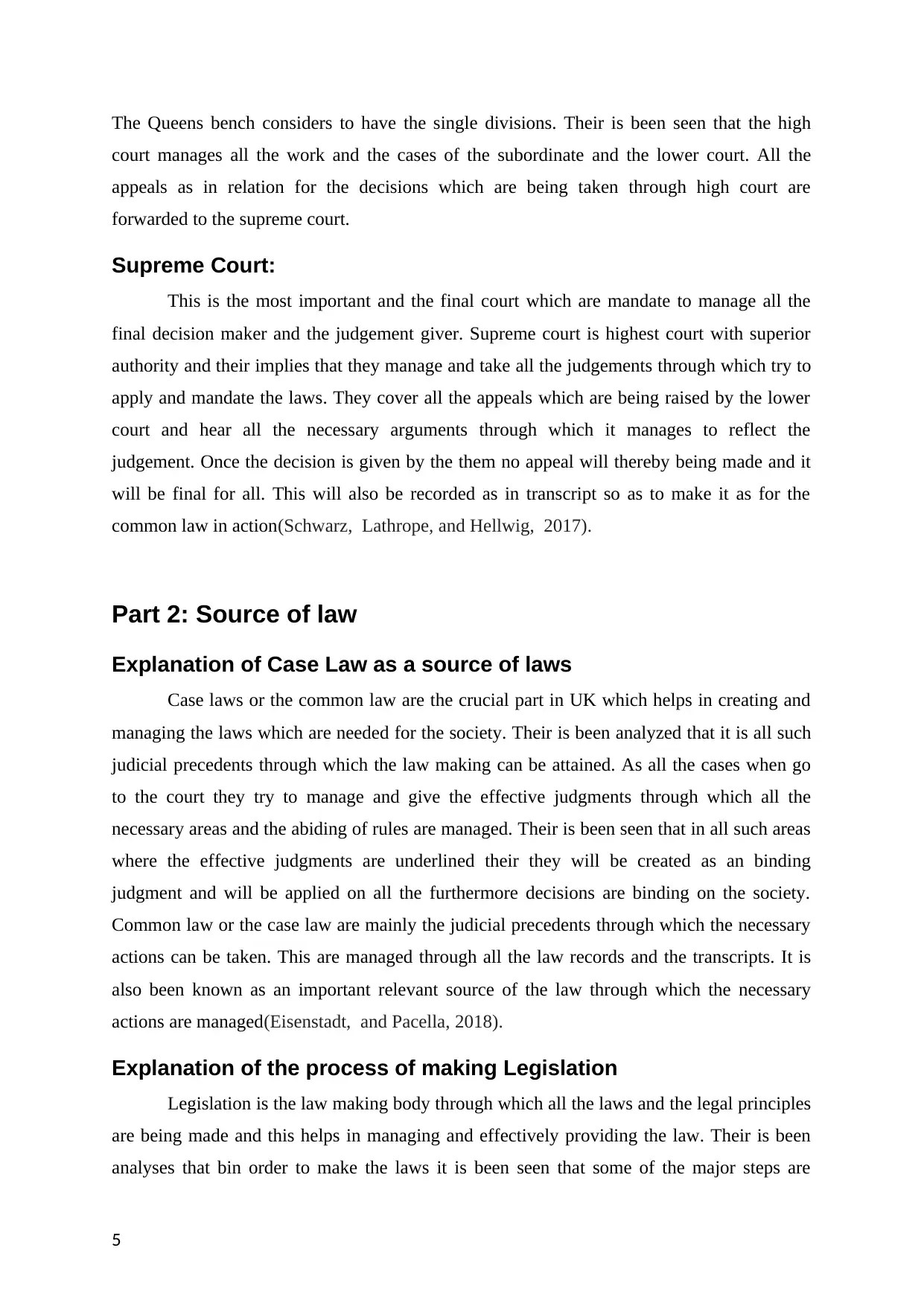
The Queens bench considers to have the single divisions. Their is been seen that the high
court manages all the work and the cases of the subordinate and the lower court. All the
appeals as in relation for the decisions which are being taken through high court are
forwarded to the supreme court.
Supreme Court:
This is the most important and the final court which are mandate to manage all the
final decision maker and the judgement giver. Supreme court is highest court with superior
authority and their implies that they manage and take all the judgements through which try to
apply and mandate the laws. They cover all the appeals which are being raised by the lower
court and hear all the necessary arguments through which it manages to reflect the
judgement. Once the decision is given by the them no appeal will thereby being made and it
will be final for all. This will also be recorded as in transcript so as to make it as for the
common law in action(Schwarz, Lathrope, and Hellwig, 2017).
Part 2: Source of law
Explanation of Case Law as a source of laws
Case laws or the common law are the crucial part in UK which helps in creating and
managing the laws which are needed for the society. Their is been analyzed that it is all such
judicial precedents through which the law making can be attained. As all the cases when go
to the court they try to manage and give the effective judgments through which all the
necessary areas and the abiding of rules are managed. Their is been seen that in all such areas
where the effective judgments are underlined their they will be created as an binding
judgment and will be applied on all the furthermore decisions are binding on the society.
Common law or the case law are mainly the judicial precedents through which the necessary
actions can be taken. This are managed through all the law records and the transcripts. It is
also been known as an important relevant source of the law through which the necessary
actions are managed(Eisenstadt, and Pacella, 2018).
Explanation of the process of making Legislation
Legislation is the law making body through which all the laws and the legal principles
are being made and this helps in managing and effectively providing the law. Their is been
analyses that bin order to make the laws it is been seen that some of the major steps are
5
court manages all the work and the cases of the subordinate and the lower court. All the
appeals as in relation for the decisions which are being taken through high court are
forwarded to the supreme court.
Supreme Court:
This is the most important and the final court which are mandate to manage all the
final decision maker and the judgement giver. Supreme court is highest court with superior
authority and their implies that they manage and take all the judgements through which try to
apply and mandate the laws. They cover all the appeals which are being raised by the lower
court and hear all the necessary arguments through which it manages to reflect the
judgement. Once the decision is given by the them no appeal will thereby being made and it
will be final for all. This will also be recorded as in transcript so as to make it as for the
common law in action(Schwarz, Lathrope, and Hellwig, 2017).
Part 2: Source of law
Explanation of Case Law as a source of laws
Case laws or the common law are the crucial part in UK which helps in creating and
managing the laws which are needed for the society. Their is been analyzed that it is all such
judicial precedents through which the law making can be attained. As all the cases when go
to the court they try to manage and give the effective judgments through which all the
necessary areas and the abiding of rules are managed. Their is been seen that in all such areas
where the effective judgments are underlined their they will be created as an binding
judgment and will be applied on all the furthermore decisions are binding on the society.
Common law or the case law are mainly the judicial precedents through which the necessary
actions can be taken. This are managed through all the law records and the transcripts. It is
also been known as an important relevant source of the law through which the necessary
actions are managed(Eisenstadt, and Pacella, 2018).
Explanation of the process of making Legislation
Legislation is the law making body through which all the laws and the legal principles
are being made and this helps in managing and effectively providing the law. Their is been
analyses that bin order to make the laws it is been seen that some of the major steps are
5
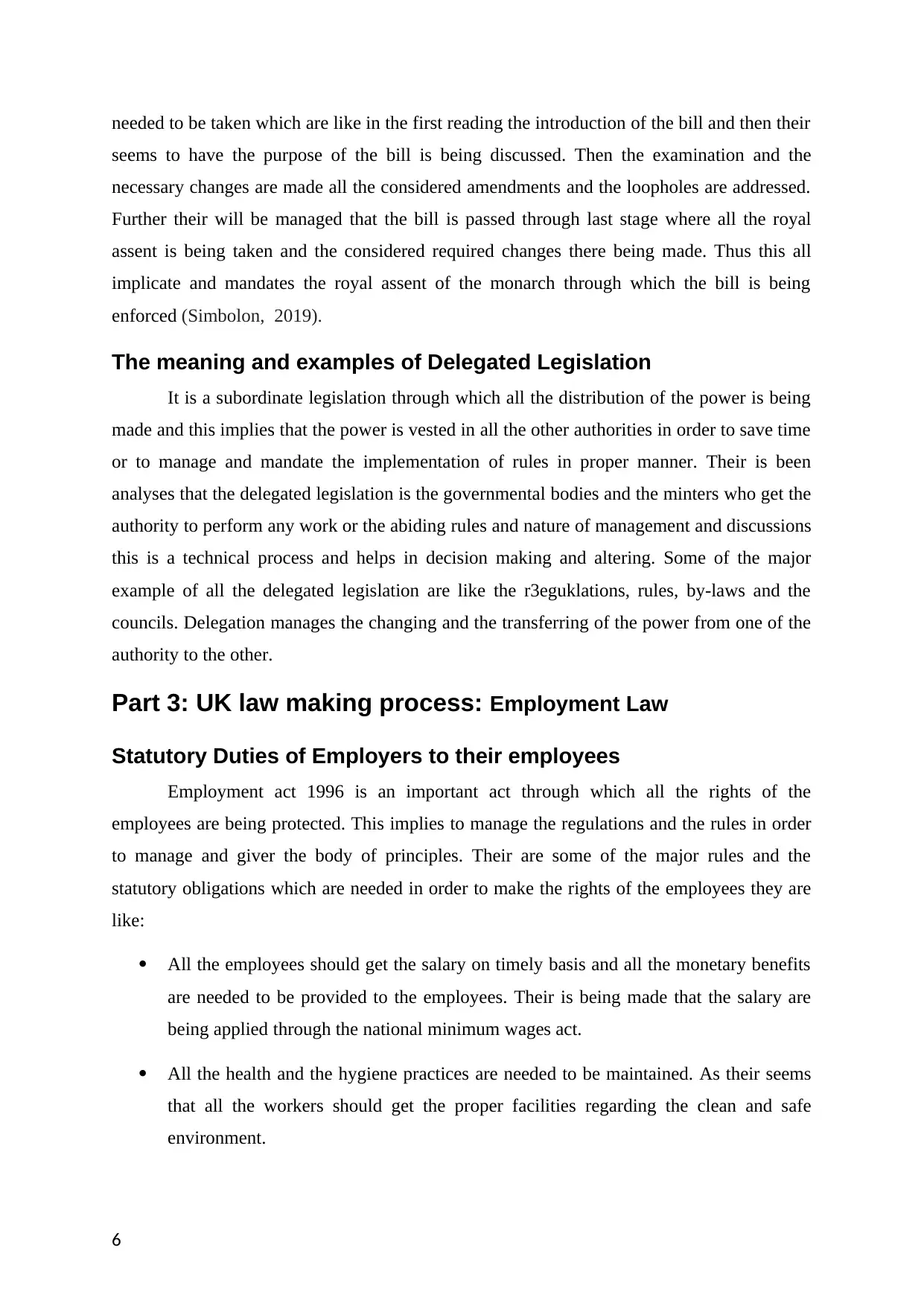
needed to be taken which are like in the first reading the introduction of the bill and then their
seems to have the purpose of the bill is being discussed. Then the examination and the
necessary changes are made all the considered amendments and the loopholes are addressed.
Further their will be managed that the bill is passed through last stage where all the royal
assent is being taken and the considered required changes there being made. Thus this all
implicate and mandates the royal assent of the monarch through which the bill is being
enforced (Simbolon, 2019).
The meaning and examples of Delegated Legislation
It is a subordinate legislation through which all the distribution of the power is being
made and this implies that the power is vested in all the other authorities in order to save time
or to manage and mandate the implementation of rules in proper manner. Their is been
analyses that the delegated legislation is the governmental bodies and the minters who get the
authority to perform any work or the abiding rules and nature of management and discussions
this is a technical process and helps in decision making and altering. Some of the major
example of all the delegated legislation are like the r3eguklations, rules, by-laws and the
councils. Delegation manages the changing and the transferring of the power from one of the
authority to the other.
Part 3: UK law making process: Employment Law
Statutory Duties of Employers to their employees
Employment act 1996 is an important act through which all the rights of the
employees are being protected. This implies to manage the regulations and the rules in order
to manage and giver the body of principles. Their are some of the major rules and the
statutory obligations which are needed in order to make the rights of the employees they are
like:
All the employees should get the salary on timely basis and all the monetary benefits
are needed to be provided to the employees. Their is being made that the salary are
being applied through the national minimum wages act.
All the health and the hygiene practices are needed to be maintained. As their seems
that all the workers should get the proper facilities regarding the clean and safe
environment.
6
seems to have the purpose of the bill is being discussed. Then the examination and the
necessary changes are made all the considered amendments and the loopholes are addressed.
Further their will be managed that the bill is passed through last stage where all the royal
assent is being taken and the considered required changes there being made. Thus this all
implicate and mandates the royal assent of the monarch through which the bill is being
enforced (Simbolon, 2019).
The meaning and examples of Delegated Legislation
It is a subordinate legislation through which all the distribution of the power is being
made and this implies that the power is vested in all the other authorities in order to save time
or to manage and mandate the implementation of rules in proper manner. Their is been
analyses that the delegated legislation is the governmental bodies and the minters who get the
authority to perform any work or the abiding rules and nature of management and discussions
this is a technical process and helps in decision making and altering. Some of the major
example of all the delegated legislation are like the r3eguklations, rules, by-laws and the
councils. Delegation manages the changing and the transferring of the power from one of the
authority to the other.
Part 3: UK law making process: Employment Law
Statutory Duties of Employers to their employees
Employment act 1996 is an important act through which all the rights of the
employees are being protected. This implies to manage the regulations and the rules in order
to manage and giver the body of principles. Their are some of the major rules and the
statutory obligations which are needed in order to make the rights of the employees they are
like:
All the employees should get the salary on timely basis and all the monetary benefits
are needed to be provided to the employees. Their is being made that the salary are
being applied through the national minimum wages act.
All the health and the hygiene practices are needed to be maintained. As their seems
that all the workers should get the proper facilities regarding the clean and safe
environment.
6
⊘ This is a preview!⊘
Do you want full access?
Subscribe today to unlock all pages.

Trusted by 1+ million students worldwide
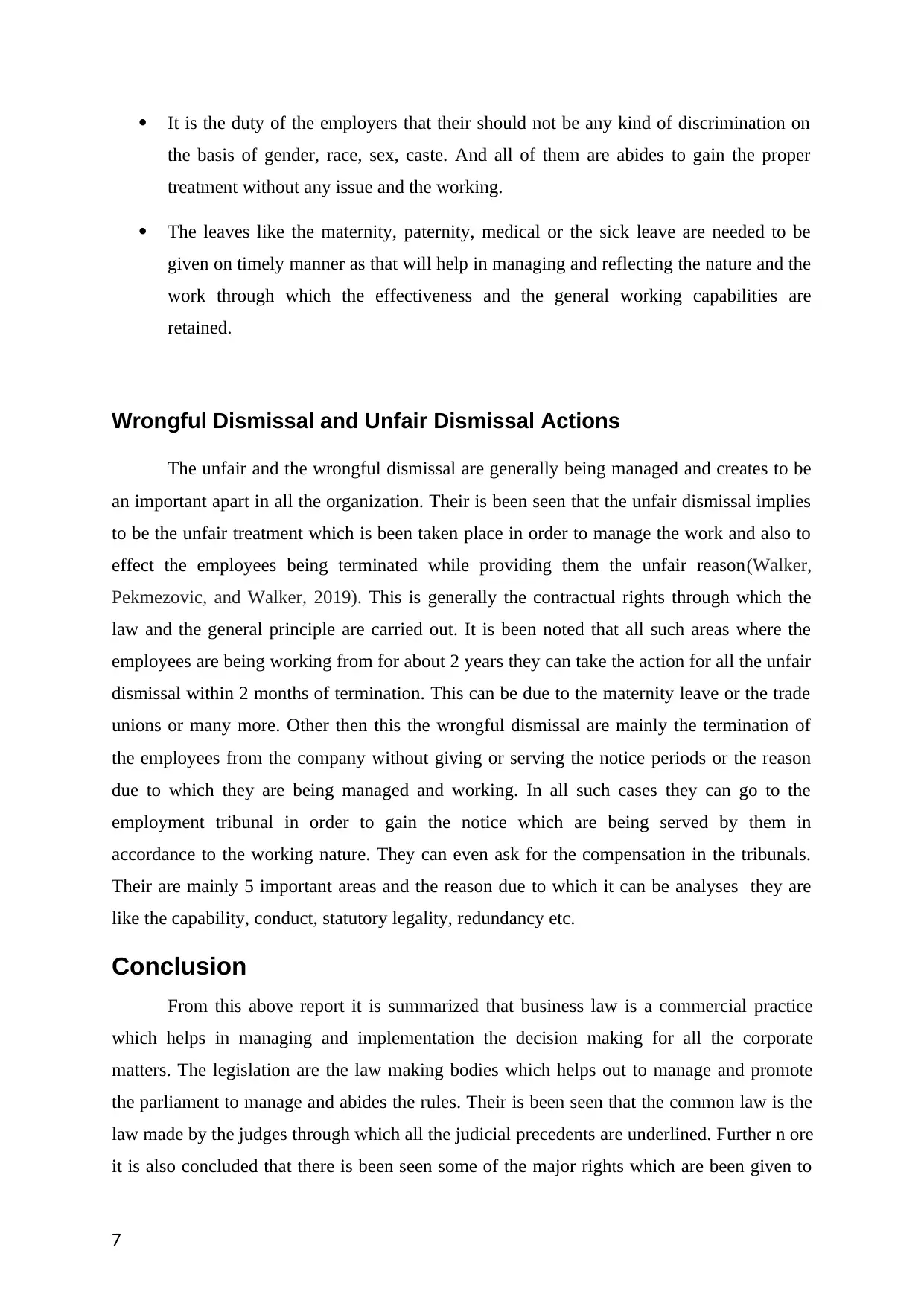
It is the duty of the employers that their should not be any kind of discrimination on
the basis of gender, race, sex, caste. And all of them are abides to gain the proper
treatment without any issue and the working.
The leaves like the maternity, paternity, medical or the sick leave are needed to be
given on timely manner as that will help in managing and reflecting the nature and the
work through which the effectiveness and the general working capabilities are
retained.
Wrongful Dismissal and Unfair Dismissal Actions
The unfair and the wrongful dismissal are generally being managed and creates to be
an important apart in all the organization. Their is been seen that the unfair dismissal implies
to be the unfair treatment which is been taken place in order to manage the work and also to
effect the employees being terminated while providing them the unfair reason(Walker,
Pekmezovic, and Walker, 2019). This is generally the contractual rights through which the
law and the general principle are carried out. It is been noted that all such areas where the
employees are being working from for about 2 years they can take the action for all the unfair
dismissal within 2 months of termination. This can be due to the maternity leave or the trade
unions or many more. Other then this the wrongful dismissal are mainly the termination of
the employees from the company without giving or serving the notice periods or the reason
due to which they are being managed and working. In all such cases they can go to the
employment tribunal in order to gain the notice which are being served by them in
accordance to the working nature. They can even ask for the compensation in the tribunals.
Their are mainly 5 important areas and the reason due to which it can be analyses they are
like the capability, conduct, statutory legality, redundancy etc.
Conclusion
From this above report it is summarized that business law is a commercial practice
which helps in managing and implementation the decision making for all the corporate
matters. The legislation are the law making bodies which helps out to manage and promote
the parliament to manage and abides the rules. Their is been seen that the common law is the
law made by the judges through which all the judicial precedents are underlined. Further n ore
it is also concluded that there is been seen some of the major rights which are been given to
7
the basis of gender, race, sex, caste. And all of them are abides to gain the proper
treatment without any issue and the working.
The leaves like the maternity, paternity, medical or the sick leave are needed to be
given on timely manner as that will help in managing and reflecting the nature and the
work through which the effectiveness and the general working capabilities are
retained.
Wrongful Dismissal and Unfair Dismissal Actions
The unfair and the wrongful dismissal are generally being managed and creates to be
an important apart in all the organization. Their is been seen that the unfair dismissal implies
to be the unfair treatment which is been taken place in order to manage the work and also to
effect the employees being terminated while providing them the unfair reason(Walker,
Pekmezovic, and Walker, 2019). This is generally the contractual rights through which the
law and the general principle are carried out. It is been noted that all such areas where the
employees are being working from for about 2 years they can take the action for all the unfair
dismissal within 2 months of termination. This can be due to the maternity leave or the trade
unions or many more. Other then this the wrongful dismissal are mainly the termination of
the employees from the company without giving or serving the notice periods or the reason
due to which they are being managed and working. In all such cases they can go to the
employment tribunal in order to gain the notice which are being served by them in
accordance to the working nature. They can even ask for the compensation in the tribunals.
Their are mainly 5 important areas and the reason due to which it can be analyses they are
like the capability, conduct, statutory legality, redundancy etc.
Conclusion
From this above report it is summarized that business law is a commercial practice
which helps in managing and implementation the decision making for all the corporate
matters. The legislation are the law making bodies which helps out to manage and promote
the parliament to manage and abides the rules. Their is been seen that the common law is the
law made by the judges through which all the judicial precedents are underlined. Further n ore
it is also concluded that there is been seen some of the major rights which are been given to
7
Paraphrase This Document
Need a fresh take? Get an instant paraphrase of this document with our AI Paraphraser
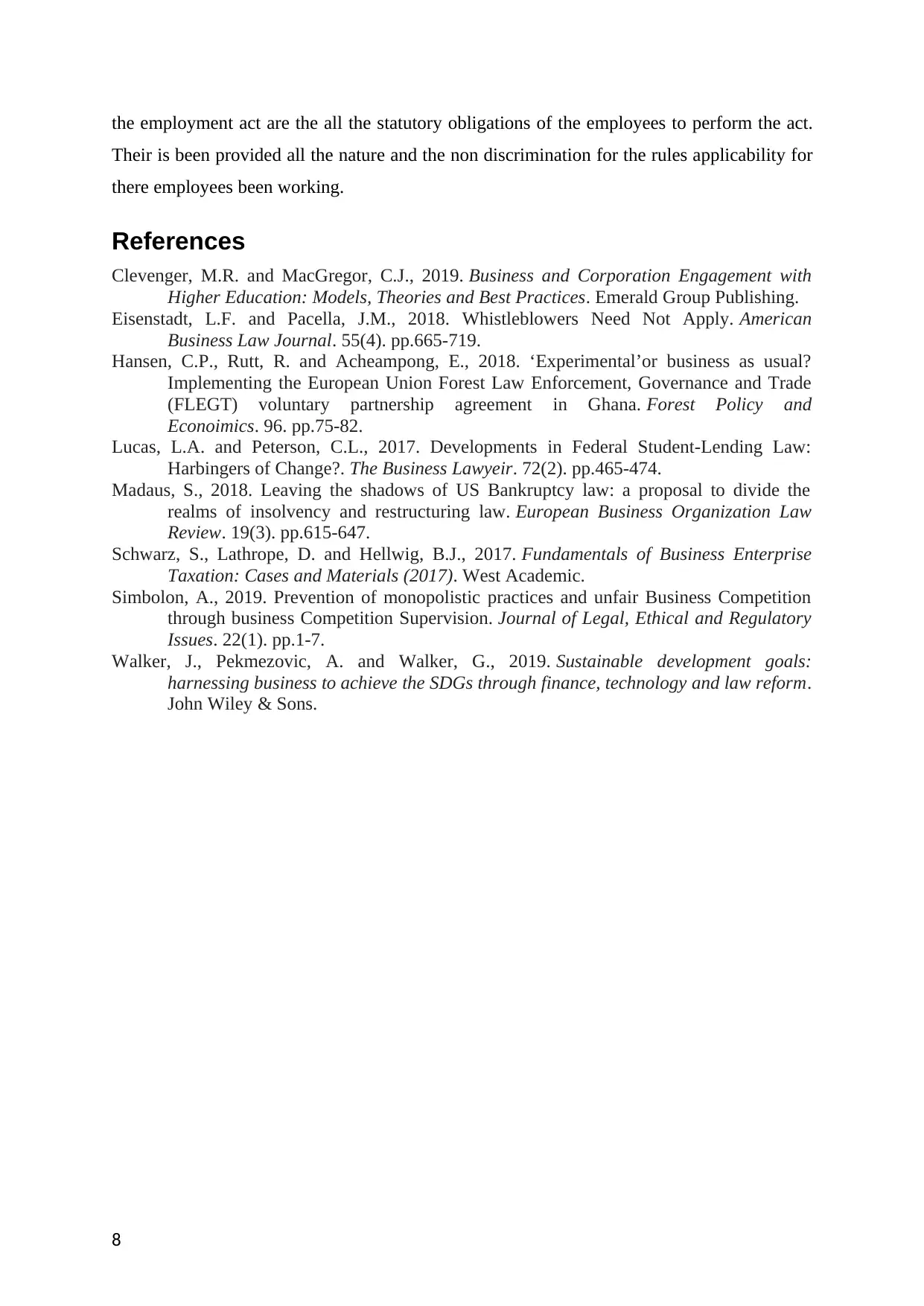
the employment act are the all the statutory obligations of the employees to perform the act.
Their is been provided all the nature and the non discrimination for the rules applicability for
there employees been working.
References
Clevenger, M.R. and MacGregor, C.J., 2019. Business and Corporation Engagement with
Higher Education: Models, Theories and Best Practices. Emerald Group Publishing.
Eisenstadt, L.F. and Pacella, J.M., 2018. Whistleblowers Need Not Apply. American
Business Law Journal. 55(4). pp.665-719.
Hansen, C.P., Rutt, R. and Acheampong, E., 2018. ‘Experimental’or business as usual?
Implementing the European Union Forest Law Enforcement, Governance and Trade
(FLEGT) voluntary partnership agreement in Ghana. Forest Policy and
Econoimics. 96. pp.75-82.
Lucas, L.A. and Peterson, C.L., 2017. Developments in Federal Student-Lending Law:
Harbingers of Change?. The Business Lawyeir. 72(2). pp.465-474.
Madaus, S., 2018. Leaving the shadows of US Bankruptcy law: a proposal to divide the
realms of insolvency and restructuring law. European Business Organization Law
Review. 19(3). pp.615-647.
Schwarz, S., Lathrope, D. and Hellwig, B.J., 2017. Fundamentals of Business Enterprise
Taxation: Cases and Materials (2017). West Academic.
Simbolon, A., 2019. Prevention of monopolistic practices and unfair Business Competition
through business Competition Supervision. Journal of Legal, Ethical and Regulatory
Issues. 22(1). pp.1-7.
Walker, J., Pekmezovic, A. and Walker, G., 2019. Sustainable development goals:
harnessing business to achieve the SDGs through finance, technology and law reform.
John Wiley & Sons.
8
Their is been provided all the nature and the non discrimination for the rules applicability for
there employees been working.
References
Clevenger, M.R. and MacGregor, C.J., 2019. Business and Corporation Engagement with
Higher Education: Models, Theories and Best Practices. Emerald Group Publishing.
Eisenstadt, L.F. and Pacella, J.M., 2018. Whistleblowers Need Not Apply. American
Business Law Journal. 55(4). pp.665-719.
Hansen, C.P., Rutt, R. and Acheampong, E., 2018. ‘Experimental’or business as usual?
Implementing the European Union Forest Law Enforcement, Governance and Trade
(FLEGT) voluntary partnership agreement in Ghana. Forest Policy and
Econoimics. 96. pp.75-82.
Lucas, L.A. and Peterson, C.L., 2017. Developments in Federal Student-Lending Law:
Harbingers of Change?. The Business Lawyeir. 72(2). pp.465-474.
Madaus, S., 2018. Leaving the shadows of US Bankruptcy law: a proposal to divide the
realms of insolvency and restructuring law. European Business Organization Law
Review. 19(3). pp.615-647.
Schwarz, S., Lathrope, D. and Hellwig, B.J., 2017. Fundamentals of Business Enterprise
Taxation: Cases and Materials (2017). West Academic.
Simbolon, A., 2019. Prevention of monopolistic practices and unfair Business Competition
through business Competition Supervision. Journal of Legal, Ethical and Regulatory
Issues. 22(1). pp.1-7.
Walker, J., Pekmezovic, A. and Walker, G., 2019. Sustainable development goals:
harnessing business to achieve the SDGs through finance, technology and law reform.
John Wiley & Sons.
8
1 out of 8
Related Documents
Your All-in-One AI-Powered Toolkit for Academic Success.
+13062052269
info@desklib.com
Available 24*7 on WhatsApp / Email
![[object Object]](/_next/static/media/star-bottom.7253800d.svg)
Unlock your academic potential
Copyright © 2020–2025 A2Z Services. All Rights Reserved. Developed and managed by ZUCOL.

